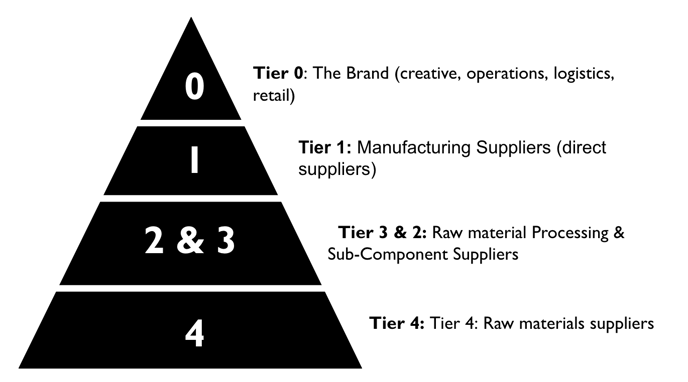Definitions of key terminology to help in understanding the Happy Worker guarantee
Supply Chain: A supply chain is a network of individuals, organisations, resources, activities, and technology involved in the creation of a product. A supply chain encompasses everything from sourcing raw materials to the manufacturing through to delivery to the end user.
Depending on what you are producing, the materials you use and the scale at which you are producing, the length and complexity of your supply chain will vary. Supply chains are broken down into numeric tiers.

Tier 0: The Brand (creative, operations, logistics, retail) is the key decision maker of the supply chain, and ideally, brands would be able to ensure that all stakeholders who work directly or indirectly for the brand are acting in the interest of the brand – whether it be in terms of price, quality, ethical or sustainability requirements.
Tier 1: Manufacturing Suppliers (direct suppliers) are those who produce the final product for a brand, otherwise known as manufacturing suppliers, final assembly suppliers or more commonly direct suppliers.
Tier 3 & 2: Sub-suppliers to a brand, providing the processed raw materials (e.g. fabric, tanned leather, processed ingredients, metal and jewellery components). These materials are then purchased by the manufacturer (your direct tier 1 supplier).
Tier 4: Raw materials suppliers produce the materials and substances used in the primary production of a product. For example, cotton farmers, gold-miners, raw beauty ingredients.
Traceability: This means that you have oversight of your supply chain and are able to ‘trace’ all the parties involved. For example, this means you know where and by whom all components of your product are produced and how they move from one stage to the next.
Transparency: This means that you are able to communicate all this information through your supply chain, publicly to customers and other stakeholders. It is important to note that this means communicating all information honestly, without withholding information or cherry picking key elements.
Due diligence: This is the process of assessing and mitigating risk within the supply chain, both environmental and human rights impacts. Due diligence enables you to conduct business in a responsible manner.
Ethical Trade Audit: Ethical trade audits are carried out by third-party auditors who assess the working conditions of a factory or farm against an ethical trade code of conduct based on international labour rights law. Audits aim to provide assurances to brands that their suppliers are complying with international and local labour rights laws as well as health and safety laws. They also provide a framework for improvement, helping to facilitate conversation between manufacturers and brands.
However, it should be said that whilst audits can provide an overview of conditions in factories and farms, they do not solve the root causes of labour rights and human rights abuses in supply chains.
An exhaustive list of social responsibility audit providers can be found here. The most common audits are:
